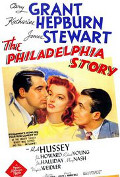
Directed by
George Cukor
112 minutes
Rated G
Reviewed by
Bernard Hemingway

The Philadelphia Story
Katharine Hepburn, Cary Grant and James Stewart and the fourth main actor, Ruth Hussey, who did not have the same iconic status as her three co-stars and who has a lesser role, under the guidance of director George Cukor adapt a fast-paced hit 1939 Broadway play by Philip Barry set amongst the Long Island smart set.
Hepburn (who had played the part on Broadway), owned the film rights (apparently she had been given them by Howard Hughes) and chose Grant and Stewart as her co-stars) plays rich girl, Tracy Lord, not long divorced from C. K. Dexter Haven (Grant), and who is about to marry straight-man George Kittredge (John Howard). Tracy’s father (John Halliday) is a philanderer on whom society gossip magazine, Spy, for which Dexter works, is about to publish a tell-all piece. Dexter, who, of course, still holds a torch for Tracy cooks up a scheme to sneak in two Spy employees, writer Macauley "Mike" Connor (Stewart) and his good sport girlfriend and photographer, Liz Imbrie (Hussey), to do an inside story on the wedding in exchange for quashing the dirt on Dad.
Barry’s original play is an entertaining comedy of manners and Cukor does not stray greatly from the theatrical form, the film being noticeably broken into discrete scenes and the actors entering and exiting as if on a stage. Indeed the film only works from this point-of-view, the idea of the debonaire Grant as a booze artist and wife-beater is hardly convincing nor is Hepburn as an ice queen, the actress being inherently too feisty for the haughty character she is supposed to be, something which makes her marriage to dull old George a bit of a mystery. Even more grievously Stewart with his countrified drawl and familiar everyman shtick is even less convincing as a writer who attracts Tracy with his down-home candour. Only Hussey really fits the bill. Still dialogue is zesty and the film stands as a witty farce poking fun at the idle rich rounded out with neat little homily about human frailty. It was a hit on both stage and screen
FYI: Surprisingly, given that it was no great feat James Stewart picked up the Best Actor Oscar for his effort whilst, more understandably, so did Donald Ogden Stewart for his screenplay (to which Waldo Salt was an uncredited contributor). Hepburn was also nominated for an Oscar but lost to Ginger Rogers for Kitty Foyle.
The film was re-made in a musical form with far less success in 1956 as High Society.
Want something different?





